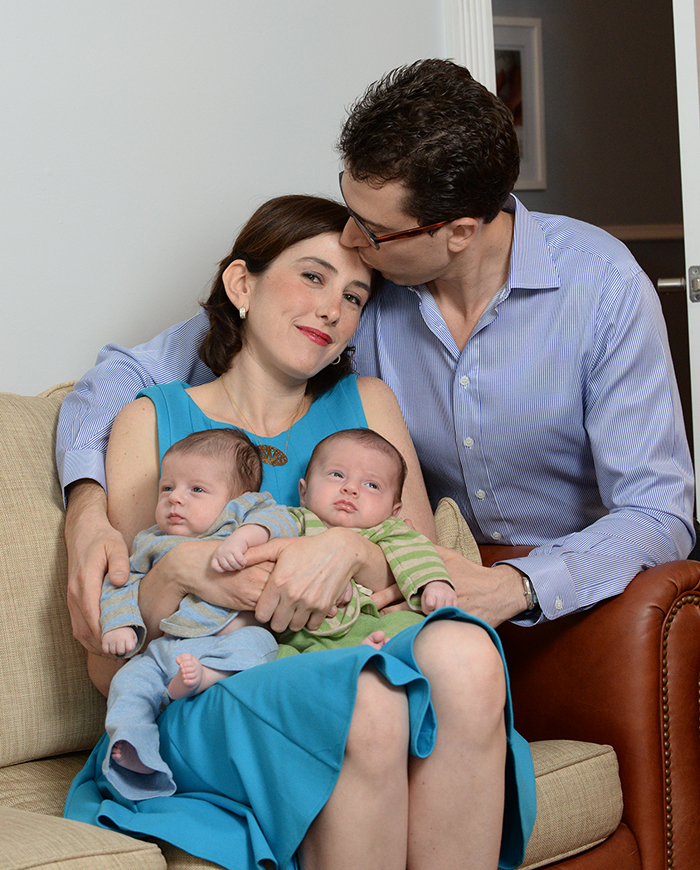I was under the impression that once you decide to start a family, you toss the birth control and give it the “old college try.” BAM! There you are in your cute maternity jeans, booking your family trip to Disney World.
I was surely mistaken. The reality: My husband and I suffered through years of failed infertility treatments, disappointment and expense. We attempted IUI (intrauterine insemination), IVF (in vitro fertilization), injected boxes of hormones and endured multiple miscarriages. We decided that we had endured enough and yet we didn’t want to give up our dream of having a biological child.
According to Resolve, a leading infertility advocacy organization, infertility impacts 7.3 million Americans. About a third is attributed to the female partner, a third to the male partner and the last third to a combination of factors or is unexplained – as is our case.
Eventually we reached a juncture and had to reassess. We had several frozen embryos from a prior cycle. I could try IVF again by means of a FET (frozen embryo transfer) but as much as I wanted to be pregnant my chances of success were very slim; ultimately our doctor approved us for surrogacy.
Although my husband was thrilled, I was initially unsettled with the decision. My pregnant friends made comments like, “at least you won’t get fat or have morning sickness.” This was initially upsetting, yet I ultimately took their comments in stride.
Finding a surrogacy agency, surrogate, attorney, finalizing medical and psychological testing, and finishing the surrogacy contract took six months. During that time, I was able to process everything and was excited about the opportunity. Financial concerns are of paramount importance as surrogacy can range from $60,000 to $150,000. Some expenses include medical costs for IVF, medications, two attorneys: one to write the contract and one to review for the surrogate, the surrogate agency fee, medical insurance for the surrogate and reasonable living expenses of the surrogate.
My husband and I interviewed multiple candidates before selecting our amazing surrogate. The first surrogate we disqualified based on moral differences. The second potential surrogate was excluded after she did not pass the physical screening. The third time was most delightfully the charm! She and her husband were warm, friendly, positive, and genuinely excited to help us expand our family.
Following the transfer of embryos, carefully selected by the embryologist, came the waiting. It takes 10 days – affectionately known as the 2ww (2 week wait). Fast forward four days post procedure. I’m at work on a call and I receive a text of a positive pregnancy test – the voice on the phone becomes a blur.
Finally, there was confirmation by the official pregnancy test. Not only was our surrogate pregnant, the test indicated twins. My husband and I were overjoyed. To our amazement, the second trimester rolled around. It was soon time to travel to the surrogate’s hometown to attend the gender ultrasound. We were overjoyed to learn that she was pregnant with twin boys.
During the pregnancy, the surrogate and I communicated daily. For the doctor’s appointments that we couldn’t make, she recorded the ultrasounds and sent photos. I followed up with a call to the doctor’s office to review. Our surrogate was truly incredible during the process and was genuinely excited for our gestating twins.
Prior to my infertility experience, I practiced only transactional law. My infertility/surrogacy journey inspired me to branch out my practice to include surrogacy and reproductive technology law, awarding me the pleasure of helping others.
I know it is a daunting prospect when considering surrogacy and I can now help others navigate through the system to understand the process and the legal implications.
As a fun side note, we are among celebrities that have ventured down the surrogacy road such as Jimmy Fallon, Sarah Jessica Parker, and Elton John. We received unbelievable support from our family, friends, community and new surrogacy family to help make what seemed impossible become a reality. As my surrogate always saYS, “It takes teamwork to make the dream work.”
Throughout this journey, my husband and I and our supportive family and friends have grown closer; you truly learn the quality of a relationship when tested with a challenge. This experience shaped my career, which will help others cope with infertility. I never would have imagined this scenario, but I intend to turn it into a positive, constructive path. I look forward to sharing my knowledge and helping others fulfill their dreams. ?
Marla Neufeld is an attorney in the family law practice at Greenspoon Marder, a full service Florida law firm founded in 1981. Contact Marla for a free consultation at 954.761.2929 or Marla.Neufeld@gmlaw.com.
Five Key Questions about Surrogacy in Florida
1. Can I use a surrogate to “save my figure?”
Elle magazine recently coined the phrase “social surrogacy” to highlight women seeking to use a surrogate to sidestep pregnancy for convenience. Under Florida law, you cannot use a surrogate for non-medical reasons.
2. What should I look for when selecting a surrogate?
A surrogate should understand that she will have to interrupt family and work schedules to attend recurring medical appointments, as well as undergo fertility drug protocols and embryo transfers. The surrogate and commissioning couple must agree about difficult issues, such as the number of embryos to transfer and termination or selective reduction if medically necessary. You want to ensure the surrogate leads a healthy lifestyle and has a good support system. Preferably she has had a prior, uncomplicated birth, minimal number of Caesarian deliveries, is free of a criminal history and generally no older than 40. Never underestimate your instinct.
3. Can same sex couples use surrogacy in Florida to start a family?
Yes. Florida does not prohibit egg or sperm donation for same sex couples. There are additional steps required for same sex couples to ensure parental rights. In late 2013, the Florida Supreme Court held that part of a state law was unconstitutional because it only allowed legally married, heterosexual couples to retain parental rights to children born as the result of donated genetic material from one party to the other. (The case involved a lesbian couple where one donated the embryo and the other gave birth.)
4. Will insurance cover any of the surrogate’s medical expenses?
Under a surrogacy contract, the commissioning couple is responsible for all medical costs. Many insurance policies specifically exclude coverage for women who are serving as surrogates. However, some insurance companies specifically issue coverage for surrogacy. After delivery, the obstetrical benefit coverage of the commissioning couple, if applicable, will cover the expenses of the child.
5. Who are the predominant contributors in a surrogacy journey?
Social workers, psychologists, physicians, and lawyers often evaluate the surrogate to make the right match with the commissioning couple. Reproductive technology lawyers negotiate egg donation and surrogacy contracts and prepare documents to confirm the parental rights.














